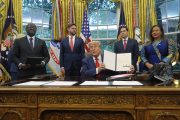
House Republicans vowing to reform a number of items are turning their attention to the United Nations, preparing to continue an already long-raging battle on Capitol Hill over the financial cost of American involvement in the organization. As it stands now, the United States finances about 22 percent of the total budget of the United Nations.
The Washington Times reports, “The new Republican majority in the House is poised to revive some old battles over the U.S. government’s financial contribution to the United Nations, vowing once again to use the power of America’s purse to force what it calls needed reforms at the world body.”
Ileana Ros-Lehtinen (R-Fla.), the new House Foreign Affairs Committee Chairwoman, indicates that she will use the threat of withholding payments to prompt the United Nations to cut costs and clean up its image.
“The majority of our members are on board to reform the corrupt and mismanaged U.N. and get a much better return for our dollars,” Ros-Lehtinen says. “Cutting the budget is not enough, because you need to reform the monster, you need to reform the beast, and if you don’t get fundamental reform, you are still rewarding a corrupt, mismanaged agency.”
While the Foreign Affairs Committee does not have the authority to make such a decision, it does in fact provide the Appropriations Committee with an agenda for foreign-affairs spending and therefore maintains some clout.
Ros-Lehtinen has indicated that Representative Kay Granger, head of the key Appropriations subcommittee, is a “willing partner.”
Likewise, Ros-Lehtinen warns that she will be introducing legislation that will improve oversight of U.N. agencies, which include the U.N. Development Program (UNDP), and the International Atomic Energy Agency (IAEA). She also states that the legislation will propose cutting funding to the Human Rights Council, an agency harshly criticized for its anti-Israel stance and inclusion of nations guilty of human rights violations.
The bill is also proposing that financial contributions to the United Nations be voluntary. A number of U.N. agencies are currently funded voluntarily, including the World Food Program and UNICEF.
Ros-Lehtinen observed, “We’ve approached this [in the past] with no strings attached, and we pay every cent of the contributions that the U.N. assesses us. Then the de facto policy becomes, ‘Money now, reform never.’ So we have to ask ourselves: What are we getting from the U.N. in return?”
According to the Washington Times, “One early sign of Mrs. Ros-Lehtinen’s seriousness: The first scheduled hearing of her committee was titled ‘The United Nations: Urgent Problems That Need Congressional Action.’ Originally set for Jan. 12, the hearing was postponed last week after the shootings in Tucson, Ariz., and now is slated for Jan. 25.”
Whether Ros-Lehtinen’s efforts can successfully challenge the Democratic leadership in the Senate is unlikely, however.
While Democrat Representative Howard Berman — former committee chairman — claims to agree with Ros-Lehtinen’s concerns, he warns that the United States should not tie reform ultimatums to its dues:
That would be penny-wise and pound foolish. The whole international relations budget is at risk and is going to face some cuts unless people understand that — whether it’s the U.N. or our foreign-assistance programs or the strength of our diplomatic corps — this fundamentally undermines U.S national security interests and U.S. foreign policy interests.
Likewise, Berman and many Democrats assert that the United Nations has made significant contributions to relief efforts in Haiti, election oversight in Afghanistan, and Sudan, as well as placing important pressure against Iran’s nuclear program.
Peter Yeo of the United Nations Foundation and the Better World Campaign claims, “That is a pretty important trifecta in terms of America’s interest — and the U.N. is on the front lines.”
Ros-Lehtinen’s recommendations have already found support amongst critics of the U.N., who assert that the 192-nation body lost a great deal of credibility after scandals such as that involving Iraq’s oil-for-food program, and sexual misconduct by so-called U.N. peacekeepers in Africa.
Among Ros-Lehtinen’s supporters is Brett Schaefer of the Heritage Foundation’s Margaret Thatcher Center for Freedom. “When you take a look at the U.N. system," he notes, "the organizations that are voluntarily funded tend to be a lot more responsive to the member-states, and so when we have a criticism or question about what they are doing, we are able to get a much more cooperative response.”
Schaefer contends that the new Republican majority in the Congress could potentially return Congress to its much needed role as “bad cop to our diplomatic good cop.”
When you take a look at Congress over the last several years, you haven’t seen any kind of interest in taking up U.N. reform legislation. The Congress, both the Senate and House, have only conducted a handful of oversight hearings.
Others view Ros-Lehtinen’s efforts as ambitious but short-sighted. The John Birch Society launched a campaign against American involvement in the United Nations decades ago. JBS President John F. McManus, citing a number of reasons for this position, ranging from the UN’s regulatory powers over the United States to its warped views on human rights, concludes that America's leaders should “withdraw from the United Nations.”
It’s a policy that The John Birch Society has support for nearly 50 years.





